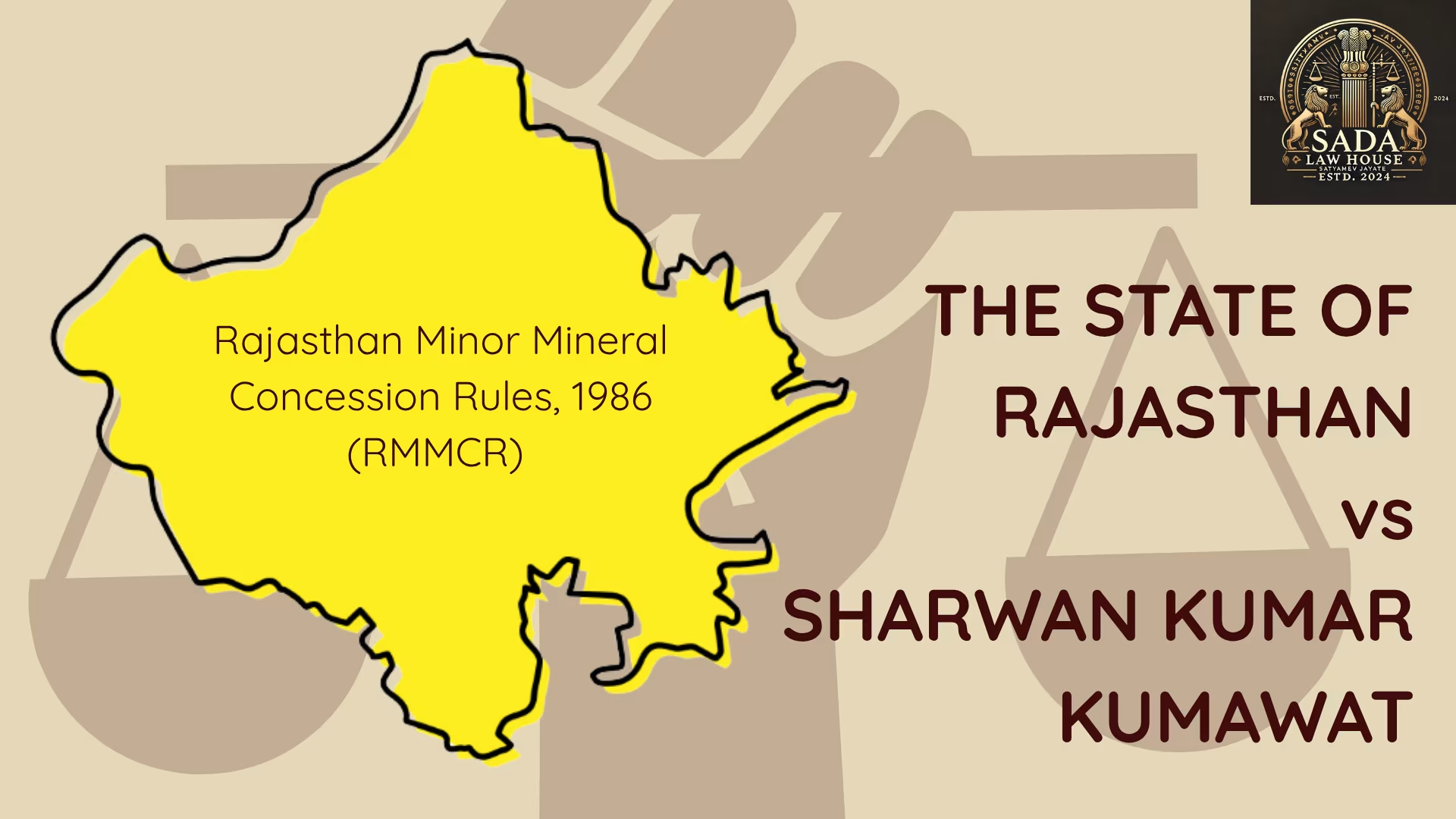State of Rajasthan v. Sharwan Kumar Kumawat (2023): Constitutionality of Amendments to the Rajasthan Minor Mineral Concession Rules
- PRABHAT KUMAR BILTORIA
- 14 October, 2025

Introduction
This case revolves around the legality and constitutionality of amendments made to the Rajasthan Minor Mineral Concession Rules, 1986 (RMMCR). The State of Rajasthan, through notifications issued in 2011 and 2013, replaced the earlier “first come, first served” system for granting mining leases with a delineation and auction-based system. The Rajasthan High Court struck down these amendments as unconstitutional, leading to an appeal before the Supreme Court. The Supreme Court’s judgment on August 1, 2023, clarified the extent of applicants’ rights and upheld the validity of the amended rules.
Background (Facts of the Case)
The State of Rajasthan issued notifications on January 28, 2011 and April 3, 2013, amending the RMMCR.
Rule 4(10) and Rule 7(3) introduced a new framework mandating the delineation and auction of government land for mining leases.
The amendments specified that all applications pending before January 27, 2011, would be rejected unless special circumstances justified consideration.
These changes effectively ended the “first come, first served” practice, replacing it with a more transparent auction system.
Applicants who had applied before the amendments, including Sharwan Kumar Kumawat, challenged the new rules.
The Rajasthan High Court invalidated the amendments, citing:
Violation of legitimate expectations of existing applicants,
Absence of a hearing opportunity, and
Infringement of alleged vested rights.
Issue of the Case
Whether the amendments to Rules 4(10) and 7(3) of the Rajasthan Minor Mineral Concession Rules, 1986 were constitutionally valid?
Whether applicants for mining leases possess any fundamental or vested right in respect of their pending applications?
Whether the amendments violated the principles of natural justice or legitimate expectation?
Whether the amendments were introduced with malicious intent to circumvent previous court orders?
Judgment
The Supreme Court upheld the amendments and allowed the State’s appeal, setting aside the High Court’s decision. The major findings were as follows:
1. No Fundamental or Vested Right in Mining
Merely submitting a mining lease application does not create a vested or enforceable right.
There is no fundamental right to obtain a mining lease, as mineral resources are the property of the State and governed by statutory regulation.
2. Legitimacy of the Amendments
The State has constitutional and statutory authority to modify rules to ensure transparency, fairness, and public interest.
The shift to an auction-based mechanism was a policy decision aimed at better mineral regulation and equitable distribution of natural resources.
3. Natural Justice and Legitimate Expectation
The doctrine of legitimate expectation cannot override public interest.
Applicants do not have a right to be heard before the introduction of a new rule or policy.
Amendments enacted for systemic improvement cannot be invalidated merely because they affect existing expectations.
4. No Legal Malice
The amendments were part of a legitimate policy reform and not intended to nullify or evade earlier High Court orders.
Previous rulings concerning specific sandstone mining cases in a few villages could not be generalized to all applicants statewide.
5. Precedent Support
The Court relied on earlier decisions, including:
State of Tamil Nadu v. Hind Stone (1981): No vested right arises from a pending mining application.
Monnet Ispat & Energy Ltd. v. Union of India (2012): Mining rights are not fundamental rights.
Kerala Beverages Corp. v. P.P. Suresh (2019): Public interest can limit legitimate expectations.
Current Status
The Supreme Court’s decision reinstated the validity of the 2011 and 2013 amendments, confirming that the auction and delineation system for granting mining leases in Rajasthan is lawful and constitutionally sound. All pending pre-2011 applications were rendered invalid unless covered by specific exceptions.
Conclusion
The Supreme Court reaffirmed that the State is the trustee of natural resources and that their allocation must be transparent, equitable, and in public interest.
Applicants have no vested or fundamental right to a mining lease.
The doctrine of legitimate expectation cannot override legislative policy reforms.
The State’s amendments introducing the auction-based system were constitutionally valid and consistent with the principles of fairness, transparency, and good governance.
This judgment strengthens the legal foundation for auction-based allocation of natural resources and affirms the supremacy of public interest in regulatory policymaking.
Case Laws






